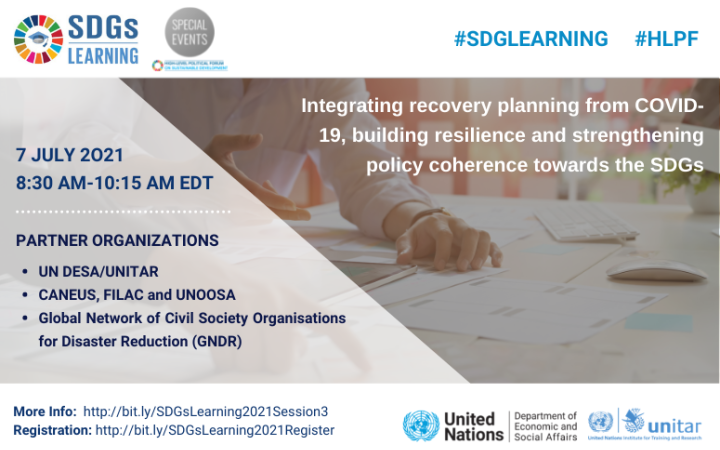7 July 2021, Geneva, Switzerland - On the 7th of July 2021, UNDESA and UNITAR, jointly with CANEUS, FILAC, UNOOSA and GNDR, organized a session entitled “Integrating recovery planning from COVID-19, building resilience and strengthening policy coherence towards the SDGs” as part of the SDGs Learning, Training & Practice Center’s learning sessions on the sidelines of the 2021 High-level Political Forum on Sustainable Development (HLPF). It was an opportunity to present the new UNDESA-UNITAR course “Integrated Recovery Planning and Policy Coherence Towards the SDGs” to policy-makers and other stakeholders.
The objective of the event moderated by Mr. Sami Areikat, Sustainable Development Officer, UNDESA – DSDG, and Mr. Milind Pimprikar, CANEUS, was to introduce global learners of the HLPF learning center the methodologies, tools and learning products that can help build national capacities for integrated recovery planning with a view to accounting for the SDG implementation and build back better. The presented methodologies emphasized the need for a participatory approach to reflect the needs of vulnerable groups, and in particular indigenous peoples’ perspectives, and benefit from their knowledge. The three featured services included the open UNDESA-UNITAR e-course “Integrated Recovery Planning and Policy Coherence Towards the SDGs”; training for integrating space-based solutions with Indigenous knowledge including participatory and community-led methods; and the local resilience assessment tool “Views from the Frontline (VFL) Lite” brining in the local perspective on governance and inclusion.
The UNDESA-UNITAR course “Integrated Recovery Planning and Policy Coherence Towards the SDGs” was the main highlight of part 1 of the learning session. In the welcoming remarks, Dr. Amson Sibanda, Chief, National Strategies and Capacity Building Branch, UNDESA, has reinforced the timeliness of the e-learning course given the pandemic and countries recovery attempts and explained that the pilot course was delivered by UNDESA and UNITAR for six countries from Western Asia and North Africa in a facilitated format – accompanied by 5 webinars and group assignments – before being rolled out to all interested participants in a massive open online course format. Ms. Veronique Verbruggen, Senior Inter-regional Adviser, UNDESA-DPIDG, has discussed the importance of ensuring that the short-term recovery efforts account for longer-term sustainable development objectives at the national level, while Ms. Elena Proden, Senior Specialist, UNITAR, has provided an overview of the 5-step methodology and how it is introduced through the course enabling the learners to build critical skills on stakeholder engagement, system thinking- based integrated analysis, the identification of accelerator areas and policy options and the development of coherent and resilient policy pathways using a number of methods presented in the course through theory and case studies. In her elaboration, Ms. Verbruggen has stressed the “unprecedented number of opportunities rather than challenges, looking ahead beyond immediate responses to health and economic crisis with behavioral changes geared towards resilient and sustainable economies” and referred to the work DPIDG on policy coherence, and the 8 building blocks of their “Readiness Assessment on Institutional Arrangements for Policy Coherence to Implement the 2030 Agenda for Sustainable Development” (available here). The course builds on a 3-year long collaboration between UNITAR and UNDESA on developing learning approaches to strengthen integrated planning at the national level and the work undertaken in the African and Caribbean regions with more than 20 countries with support from the Swiss Development Cooperation. It is expected that the e-course will be used in combination workshop-style or as part of facilitated learning in the future with specific target audiences and tailored activities.
When it comes to the impacts of the pandemic, Mr. Bijay Kumar, Executive Director, GNDR, highlighted that it amplified the existing problems with poverty, inequalities and disproportionate impacts of climate change. Mr. Bijay Kumar as well as Mr. Gabriel Muyuy, FILAC, have emphasized the importance of inclusion of indigenous peoples to ensure they are not left behind, the main focus of part 2 of the session. The presentations discussed aspects related to the integration of indigenous knowledge with emerging space-based solutions, the challenges of indigenous peoples and training opportunities to increase their participation in the processes. Ms. Lilia Yumagulova, Director, Preparing our Home Programme, has shared Canada-based youth-led solutions for community resilience with a focus on indigenous peoples – Indigenous value mapping. In addition to the asset and hazard mapping, she referred to the great work around the “language is the knowledge of the land”. Dr. Shirish Ravan, UNOOSA, has presented their MOOC on Geospatial Applications for Disaster Risk Management and provided examples on how earth observation can contribute to capturing indigenous knowledge and achieve the SDGs. “Inequities, vulnerabilities and suffering – are continual disasters exposed by coronavirus and recovery is not returning to normal because the normal caused the pandemic disaster, but we have to do better than the choices that created the disaster by drawing data and knowledge equitably including satellite monitoring and local observations ”, stated Professor IIan Kelman, Professor, his concluding presentation emphasizing the need for participatory approaches to data collection.
In part 3 of the learning session, Ms. Shivangi Chavda, Senior Regional Lead, GNDR, provided insights into the Views on the Frontline Lite, a tool for a quick risk assessment to assess the progress towards the global frameworks – SDDRR, Paris Agreement and SDGs. Dr. Jean de Dieu Musengamana, Manadisaster Organization, has shared their experience in Rwanda in Disaster Risk Reduction and Resilience.
More than 300 global learners have attended this session on zoom with many more on YouTube. The session can be watched in the link below.


